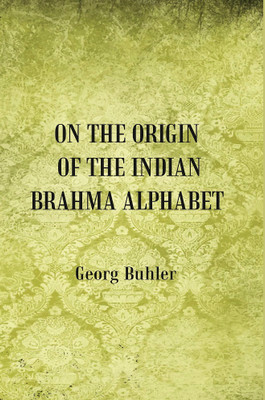On the Origin of the Indian Brahma Alphabet(Paperback, Georg Buhler)
Quick Overview
Product Price Comparison
About The Book : Brahma alphabet from the ancient Egyptian numeral signs, together with a third comparative table, in order to include in this volume all those points, which require fuller discussion, and in order to make it a serviceable companion to the palaeography of the Grundriss. The chapters on the Brahmi and the Kharosthi have been throughout revised and the first has been changed most. A new comparative table of the Semitic and Brahma signs, the same as has been used for the Grundriss, has been given. The Additional Note at the end has been omitted, as, since the appearance of M. Sylvain Levi's article on the Turkish kingdom of Northwestern India, it is no longer required, and a number of other alterations and additions has been made in accordance with the results of further researches. About The Author : Professor Johann Georg Buhler (July19,1837ŌĆōApril 8,1898) was a scholar of ancient Indian languages and law. Buhler was born to Rev. Johann G. Buhler in Borstel, Hanover, attended grammar school in Hanover, where he mastered Greek and Latin, then university as a student of theology and philosophy at Gottingen, where he studied classical philology, Sanskrit, Zend, Persian, Armenian, and Arabic. In 1858 he received his doctorate in eastern languages and archaeology; his thesis explored the suffixes in Greek grammar. That same year he went to Paris to study Sanskrit manuscripts, and in 1859 onwards to London, where he remained until October 1862. This time was used mainly for the study of the Vedic manuscripts at the India Office and the Bodleian Library at Oxford University. While in England, Buhler was first a private teacher and later (from May 1861) assistant to the Queen's librarian in Windsor Castle. In 1880 he returned to Europe and taught as a professor of Indian philology and archeology at the University of Vienna, where he worked until the end of his life.On 8 April 1898 Buhler drowned in Lake Constance, under somewhat mysterious circumstances. Contemporary accounts mostly attributed it to an accident, but it has been speculated that it was a suicide motivated by Buhler's connections to a scandal involving his former student Alois Anton Fuhrer.


